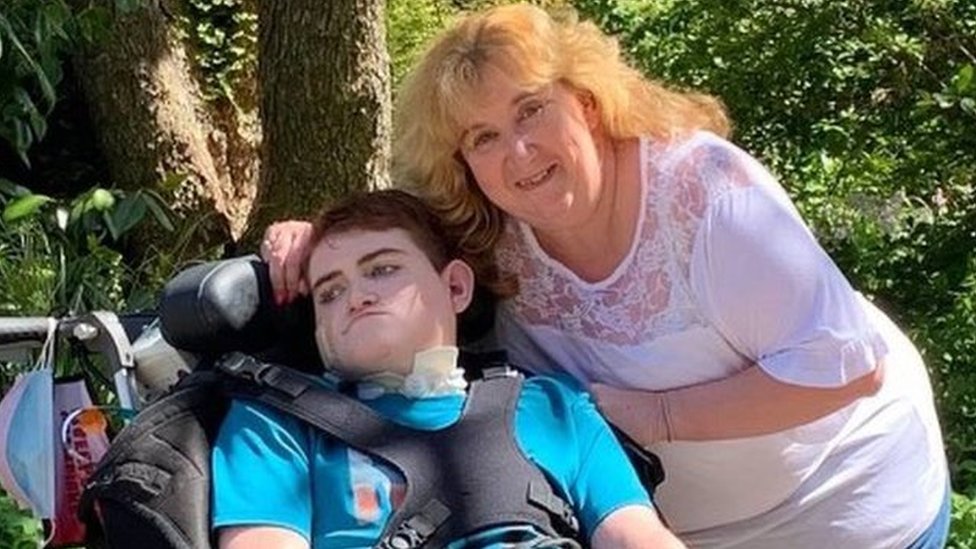
Thousands of disabled people have had their benefits paused during extended hospital stays under a rule charities say penalises the most vulnerable.
It comes after a court case was withdrawn which had been set to challenge the lawfulness of the so-called hospitalisation rule.
One affected family lost more than £5,000 in benefit payments while their disabled son was in hospital.
The government says it costs the state twice to pay benefits to patients.
Under the rule, people who claim Personal Independence Payment (PIP) have their payments suspended if they receive care in hospital for 28 days or more.
‘We have struggled through’
Cameron Mitchell, aged 21, from Carlisle, cannot walk or speak, has seizures and muscle spasms and is fed through a tube. He has the mental age of a baby of around six months old.
Mr Mitchell received PIP and his mother and carer – Nicola Clulow – received a Carer’s Allowance.
In December, 2020, Mr Mitchell was admitted to the Royal Victoria Infirmary in Newcastle, with sepsis, multi-organ failure and pneumonia.
He remained an inpatient for 185 days, before moving to a hospice. He was discharged home in June 2022.
Ms Clulow – communicating on her son’s behalf – said benefit payments were stopped while Mr Mitchell was in hospital, which was 1.5 hours’ drive from the family home.
During that time, hospital staff asked her to spot when Mr Mitchell was about to have a seizure, to interpret his pain, to feed him through a tube and to be available at all hours to assist with his care when asked.
The family said they lost more than £5,000 in benefit payments while spending about £100 per week on food and transport.
“We have had to struggle through in order to ensure all of Cameron’s needs are met. To meet Cameron’s needs is not a ‘choice’ – it is a requirement to keep him safe and to allow him to lead a dignified life,” Ms Clulow said.
The family had sought a judicial review of the current regulations, but the case has been withdrawn.
Learning disability charity Mencap’s head of policy, Dan Scorer, said people with profound and multiple learning disabilities (PMLD) were “more likely to fall foul of the 28-day rule”.
Mr Scorer said the charity would continue to work with those affected to “challenge its fairness”.
Jonathan Beebee, the Royal College of Nursing’s professional lead for learning disability nursing, said people with PMLD had “complex unique communication needs”.
“They often rely on close relations with people who know them well to understand and interpret what they are expressing,” he said.
“These communication needs cannot be replaced by hospital staff when they are admitted to hospital, and their carers cannot stop caring. If they do their needs will likely be neglected.”
Carolin Ott, the solicitor at law firm Leigh Day, which represented Mr Mitchell, said: “Our client’s case was withdrawn due to a change in his personal circumstances.
“However, that change in circumstances did not alter the underlying issues put forward in our client’s case that the hospitalisation rule is unlawful, in particular on the basis of its impact on social and dignity-related needs, and access to an adapted mobility vehicle.”
For more on this story and other cases of benefits being stopped whilst being in hospital

Comments